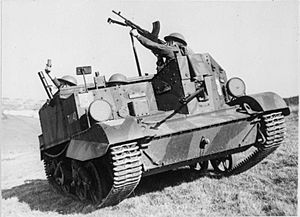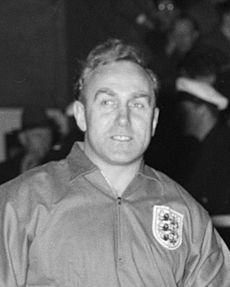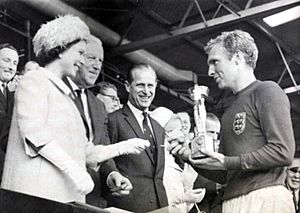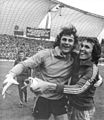Alf Ramsey facts for kids
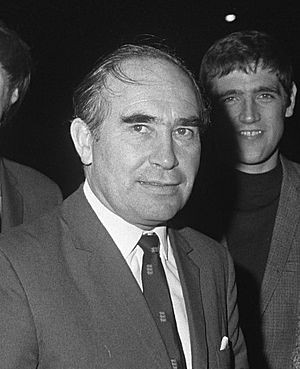
Ramsey as England manager in November 1969
|
|||||||||||||||||||
| Personal information | |||||||||||||||||||
|---|---|---|---|---|---|---|---|---|---|---|---|---|---|---|---|---|---|---|---|
| Full name | Alfred Ernest Ramsey | ||||||||||||||||||
| Date of birth | 22 January 1920 | ||||||||||||||||||
| Place of birth | Dagenham, Essex, England | ||||||||||||||||||
| Date of death | 28 April 1999 (aged 79) | ||||||||||||||||||
| Place of death | Ipswich, Suffolk, England | ||||||||||||||||||
| Height | 5 ft 8 in (1.73 m) | ||||||||||||||||||
| Position(s) | Right-back | ||||||||||||||||||
| Youth career | |||||||||||||||||||
| Five Elms | |||||||||||||||||||
| Senior career* | |||||||||||||||||||
| Years | Team | Apps | (Gls) | ||||||||||||||||
| 1943–1949 | Southampton | 90 | (8) | ||||||||||||||||
| 1949–1955 | Tottenham Hotspur | 226 | (24) | ||||||||||||||||
| Total | 316 | (32) | |||||||||||||||||
| International career | |||||||||||||||||||
| 1948 | England B | 1 | (0) | ||||||||||||||||
| 1948–1953 | England | 32 | (3) | ||||||||||||||||
| Managerial career | |||||||||||||||||||
| 1955–1963 | Ipswich Town | ||||||||||||||||||
| 1963–1974 | England | ||||||||||||||||||
| 1977–1978 | Birmingham City | ||||||||||||||||||
| 1979–1980 | Panathinaikos (Technical director) | ||||||||||||||||||
|
Medal record
|
|||||||||||||||||||
| *Club domestic league appearances and goals | |||||||||||||||||||
Sir Alfred Ernest Ramsey (born 22 January 1920 – died 28 April 1999) was an English football player and manager. As a player, he played for the England national team and was even captain. However, he is most famous for being the England manager from 1963 to 1974. During this time, he led England to win the 1966 FIFA World Cup. He was knighted in 1967 because of this amazing win. Ramsey also led England to third place in the 1968 European Championship and reached the quarter-finals of the 1970 World Cup and the 1972 European Championship. As a player, Ramsey was a defender and part of England's team for the 1950 FIFA World Cup.
Ramsey grew up in a quiet village in Essex. He was good at sports from a young age. After serving in the British Army during World War II, he started his football career. He mainly played as a right-back. People thought he was a bit slow but very smart about tactics. His nickname was "The General". He played for England 32 times between 1948 and 1953, scoring three goals and captaining the team three times. He played club football for Southampton and Tottenham Hotspur. He was part of the Tottenham team that won the English League championship in the 1950–51 season.
Ramsey stopped playing football at age 35 to become the manager of Ipswich Town. At that time, Ipswich was in the third division of English football. Ipswich quickly moved up through the leagues over the next six years. They won the Third Division South in 1956–57 and the Second Division in 1960–61. In the 1961–62 season, Ipswich's first time in the top division, Ramsey's team surprised everyone by becoming champions of England. Ramsey became the England team manager a year later. He used a new formation without traditional wingers, which led to his England team being called "The Wingless Wonders". England's World Cup win at Wembley in 1966 made Ramsey a national hero. He left the England job after the team failed to qualify for the 1974 World Cup.
After managing England, Ramsey had short roles at Birmingham City and Panathinaikos. He then retired in 1979–80. He lived a quiet life in Ipswich for the next two decades and passed away in 1999, at 79. A statue of Ramsey was put up at the new Wembley Stadium in 2009. He has also received many honors in Ipswich. He is the first person to be in the English Football Hall of Fame twice: first in 2002 for his managing, and again in 2010 for his playing. He is still seen as one of Britain's greatest football managers.
Early Life and Football Beginnings
Growing Up in Dagenham
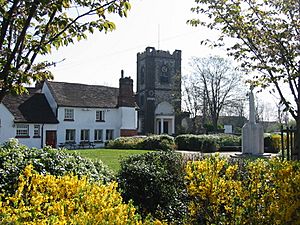
Alfred Ernest Ramsey was born on 22 January 1920 in Dagenham, Essex. Back then, Dagenham was a small farming village. He was the third of five children. His father worked hard and kept pigs. Their home was simple, without hot water or electricity. These conditions were common in Dagenham at the time.
Young Alf was a quiet boy who loved sports. He spent hours playing ball games with his brothers in the meadow behind his home. He learned skills like ball control and heading with a tennis ball. He went to Becontree Heath School, which was a long walk from his house. Alf was not the best student, but he was excellent at sports. He played football, cricket, and did track and field events. He even tried boxing until a tough fight at age 10 left him with a scar.
Alf was chosen to play for his school football team when he was only seven. He played with older boys, some as old as fourteen. At nine, he became captain. He played as a centre-half, a key position in the popular "WM" formation. His best skill was his very accurate passing. He wasn't very fast, but he made up for it by understanding the game well and being in the right place. He played for Dagenham and Essex County school teams. He also tried out for the London schools team but didn't make it.
After leaving school in 1934 at age 14, Ramsey worked as an apprentice at a local grocery store. He delivered groceries by bicycle. This job made him stronger, but he couldn't play organized football on Saturday afternoons. After two years, he joined a new amateur club called Five Elms, which played on Thursdays. In 1937–38, a scout from Portsmouth noticed him. Ramsey was offered a contract as an amateur player, but Portsmouth didn't contact him again. He continued working and playing cricket and football.
Football During World War II
When World War II started in 1939, Ramsey joined the British Army in June 1940. He was part of the Duke of Cornwall's Light Infantry. He found army life exciting and learned a lot about discipline and leadership. He said joining the army was "one of the greatest things which ever happened to me." He became a company quartermaster sergeant in an anti-aircraft unit. Ramsey spent the entire war in Britain, on home defense duties.
Being in the army allowed Ramsey to play football more often and at a higher level. In 1943, he was moved to Barton Stacey in Hampshire. His battalion team had players from other Football League clubs. On 8 October 1943, Southampton needed a centre-half for their match against Luton Town. Ramsey, then 23, was asked to play. He was unsure but agreed to try.
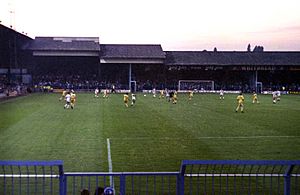
The next day, Ramsey signed as an amateur for Southampton and made his debut. He gave away a penalty kick late in the game, but Southampton still won 3–2. He played a few more matches before his unit moved. When his unit returned, Southampton offered him a professional contract. Ramsey was still unsure about a football career, but he signed after Southampton promised he could leave if he wanted. He was officially discharged from the army in June 1946.
Playing Career Highlights
Time at Southampton
The regular Football League started again for the 1946–47 season. Ramsey moved into club housing with a friend. He started in the reserve team as a centre-forward, scoring in his first three games. After five matches, the manager and trainer decided to move him to right-back. This was a big change for Ramsey's career. He learned a lot from the trainer, Sydney Cann, who had played full-back. Ramsey was eager to learn and understand the game deeply.
Ramsey made his full league debut on 26 October 1946, in a Second Division match against Plymouth Argyle. He was nervous but was helped by the experienced captain, Bill Rochford. Southampton won 5–1. Ramsey found the pace of professional football much faster than he expected. He eventually secured his place in the team.
Players described Ramsey as slow but very smart. He had excellent positional sense and passed the ball very well for a defender. He preferred to pass the ball out of defense instead of just kicking it away. He also became a specialist at taking penalty kicks because he was calm and could guess what the goalkeeper would do.
Southampton didn't win promotion in 1947–48, but Ramsey became one of their main players, sometimes even captaining the team. In May 1948, he was chosen for the England squad to tour Switzerland and Italy. This was his first time flying. He also toured Brazil with Southampton, where he helped the team understand and counter the Brazilian playing style.
By January 1949, Ramsey had played 90 league games for Southampton, scoring eight goals. He injured his knee in a friendly match. When he recovered, the manager told him it would be hard to get his place back because another player was doing well. Ramsey was very angry and asked to be put on the transfer list. He felt unfairly treated. Other clubs were interested, and in May 1949, Tottenham Hotspur signed him. This was a big transfer deal for Tottenham at the time.
Tottenham Hotspur Success
A good relationship quickly formed between Ramsey and his new manager, Arthur Rowe. They both believed in a fast, attacking style of play called "push-and-run". This style involved quick passes: a player would pass the ball to a teammate, then run past a defender to get the ball back right away. Ramsey became more than just a defender; he started attacks and was key to Tottenham's game plan with his accurate passing.
Tottenham started the 1949–50 season very well, staying unbeaten for 22 matches. Ramsey was a vital part of the team. He scored a memorable goal against Grimsby Town, running 40 yards and dribbling past three defenders. Tottenham won the 1949–50 Second Division title easily, scoring many goals and letting in few. They were promoted to the First Division.
In the 1950–51 season, Tottenham continued their great form. Ramsey was playing "the best football of his life." He was the team's strategist, making Rowe's plans happen on the field. His teammates nicknamed him "The General" because of his understanding of the game and his authority. On 28 April 1951, Tottenham became champions of England, just one year after being promoted. Ramsey felt very lucky to be part of such a great team.
Tottenham finished second in the 1951–52 season, but then their performance dropped. Many key players, including Ramsey, were getting older. Ramsey also had a recurring injury. In the 1952–53 FA Cup semi-final against Blackpool, Ramsey made a big mistake. He tried to pass the ball back to his goalkeeper, but it bounced off his knee, allowing Blackpool to score. Tottenham lost 2–1. Ramsey was heavily criticized and felt terrible about the error. It haunted him for a long time.
Despite this, Ramsey was appointed club captain in 1954. However, his playing career was nearing its end. The manager, Arthur Rowe, became ill and retired. A new player, Danny Blanchflower, joined the team, which affected Ramsey's role. Ramsey missed matches due to injury. In April 1955, he had a tough game against Leicester City. When he was left out of a post-season tour, he realized his time at Tottenham was over. He had played 250 games for Tottenham over six seasons.
England International Appearances
Ramsey first played for an England team in May 1948, for England B. He made his full England debut in December 1948, in a 6–0 win against Switzerland. He briefly lost his place but returned after playing well for Tottenham.
Ramsey joined the England team as they prepared for their first ever World Cup campaign in 1950. England was considered a favorite. The team had little practice and arrived in Brazil only a week before their first game. Ramsey found the South American conditions difficult. England won their first match against Chile 2–0.
England's next match was against the United States, a team they expected to beat easily. Ramsey played, but star winger Stanley Matthews was left out. England dominated the first half, but the US scored a surprise goal. The score remained 1–0, and England lost. This was one of England's most embarrassing upsets. Ramsey, who was very patriotic, felt deeply humiliated. England then lost to Spain and was knocked out of the tournament.
Even after this, Ramsey remained important to the England team. He captained England three times. On 28 November 1951, England played Austria, a strong attacking team. Austria led 1–0, but Ramsey scored a penalty to make it 1–1. The match ended 2–2, keeping England's unbeaten home record against overseas teams. Ramsey called this "my greatest international" match.
Ramsey played for England throughout 1952. His last game for England was on 25 November 1953, against Hungary, the "Magical Magyars," at Wembley Stadium. This match was called the "Match of the Century". England was expected to do well, but Hungary completely outplayed them, winning 6–3. Ramsey scored a penalty, his third and final international goal. He refused to accept that England had been outclassed. He never played for England again, having earned 32 caps.
Managerial Career
Leading Ipswich Town
Ramsey decided he wanted to become a coach. He had no formal qualifications or experience as a manager. In 1955, Ipswich Town, a Third Division South club, offered him a job as player-manager. Ramsey refused to play and manage at the same time, saying he would only focus on managing. Ipswich announced him as manager on 9 August 1955.
Ipswich had just been relegated from the Second Division. The club didn't have a long history of success or a lot of money for new players. Ramsey had to make the most of the players he had. He started making tactical changes, even in his first game. In his first season, Ipswich finished third, scoring 106 goals. In his second season, he led them to win the Third Division South title, again scoring over 100 goals. This meant promotion to the Second Division. For the next three seasons, Ipswich finished in the middle of the table.
In the 1960–61 season, Ramsey guided Ipswich to win the Second Division title. This brought them into the top flight for the first time ever. Many experts thought Ipswich would be relegated right away. But in the 1961–62 season, Ramsey's team surprised everyone by becoming champions of England in their first year in the top division. Ramsey built a strong team with a solid defense and two great strikers, Ray Crawford and Ted Phillips, who scored over 60 goals together. A key player was Jimmy Leadbetter, whom Ramsey moved into a deeper midfield role.
The next season started poorly for the champions. Ipswich also played in the 1962–63 European Cup, winning one round but losing to A.C. Milan. In the league, Ipswich finished 17th, just above the relegation zone. On 25 October 1962, Ramsey agreed to become the England national team manager, starting on 1 May 1963. He left Ipswich after eight seasons, having taken them from the Third Division to champions of England. After Ramsey left, Ipswich's performance dropped, and they were relegated two years later.
Leading the England Team
England lost in the quarter-finals of the 1962 World Cup. The manager, Walter Winterbottom, resigned. Ramsey was confirmed as England manager in October 1962, but he waited until May 1963 to start. He felt it was wrong to leave Ipswich while they were struggling. Ramsey demanded full control over player selections, which was new for England managers. This made him "England's first proper manager."
When he took the job, Ramsey famously predicted, "we will win the World Cup." The tournament was to be held in England in 1966. One of his first actions was to make Bobby Moore captain. Moore was only 22, making him England's youngest captain at the time.
1966 World Cup Victory
As hosts, England automatically qualified for the 1966 World Cup. Their first group game was a 0–0 draw against Uruguay. This made some people doubt Ramsey's prediction. But he stayed calm and kept trying new things. Ramsey used a 4–3–3 system.
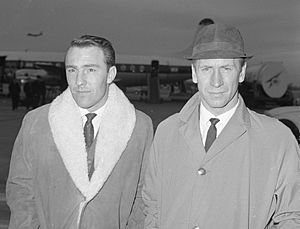
England beat Mexico 2–0 and France 2–0, qualifying for the knockout rounds. During the France match, star striker Jimmy Greaves was injured. Ramsey chose young Geoff Hurst as his replacement, seeing potential in him. This decision proved very important.
For the knockout stages, England played Argentina. Ramsey changed his formation. It was a very rough game, and Argentina's captain was sent off. England won 1–0 with a goal from Hurst. Ramsey caused some controversy by stopping his players from swapping shirts with the Argentinians. He was also reported to have called some Argentinian players "animals." This comment damaged his reputation abroad.
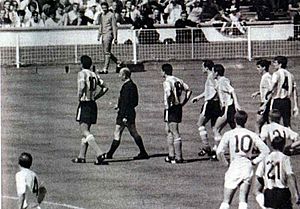
In the semi-final, England faced Portugal and their top scorer, Eusébio. England won 2–1, conceding their first goal of the tournament from a penalty.
On 30 July 1966, Ramsey's promise came true. England became World Champions by beating West Germany in the final. Ramsey faced pressure to bring back Greaves, but he stuck to his rule: "never change a winning team." He kept Hurst, who scored a hat-trick in the 4–2 win after extra time. Ramsey's tactics and decisions were key. He told his players during extra time, "You've won it once. Now you'll have to go out there and win it again."
Ramsey stayed calm during the celebrations, letting his players enjoy their achievement. He is the only England manager to have won the World Cup. Players like Bobby Charlton and Nobby Stiles praised Ramsey, saying England wouldn't have won without him.
Later Tournaments
In 1967, Ramsey was knighted, the first football manager to receive this honor. England reached the last eight of the 1968 European Championships. They lost to Yugoslavia in the semi-final and finished third after beating the Soviet Union.
England qualified automatically for the 1970 World Cup in Mexico as defending champions. They were among the favorites. England won two group games but lost to eventual champions Brazil. In the quarter-final, they lost to West Germany 3–2, after being 2–0 up. Ramsey made some substitutions that were questioned, and the stand-in goalkeeper, Peter Bonetti, made mistakes. Ramsey blamed Bonetti, but his own tactics were also criticized.
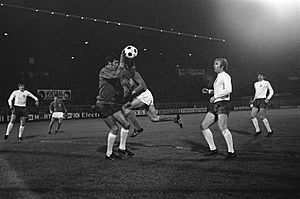
England reached the last eight of the 1972 European Championship. They faced West Germany again in a two-leg match. England lost 3–1 at home and drew 0–0 away, meaning they were eliminated.
Failing to Qualify for 1974 World Cup
England's qualification group for the 1974 World Cup included Poland and Wales. Poland had a strong team. England drew at home with Wales and lost in Poland. This meant England had to win their final match against Poland at Wembley in October 1973.
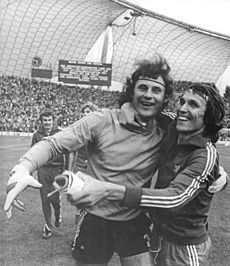
Before the game, a manager called the Polish goalkeeper, Jan Tomaszewski, a "circus clown." However, Tomaszewski played incredibly well, making many saves. The match ended 1–1. This draw meant England failed to qualify for a World Cup for the first time ever. Ramsey was criticized for waiting too long to bring on a forward.
End of England Management
After failing in three tournaments in a row, Ramsey was sacked by the FA on 1 May 1974. Some people believe certain FA officials had long-standing issues with Ramsey. Many in football felt his treatment was unfair.
After England Management
After leaving England, Ramsey took a break. He returned to Ipswich and spent time with his wife. He became a director for a sportswear company and a building firm. He also watched Ipswich Town games and sometimes appeared as a TV pundit. He briefly worked as a consultant for Birmingham City in 1977–78. He left after a disagreement with the club's board. This was his last full managerial job. He also worked as a technical adviser for the Greek team Panathinaikos in 1979–80.
Ramsey's Managerial Style
At Ipswich, Ramsey started trying out a new way of playing football. This style later led to England's World Cup success and earned his team the nickname "The Wingless Wonders." He noticed that traditional wingers often didn't help much with defense. So, he started using attacking midfielders instead. These players could attack through the middle but also drop back to defend. This was a new idea in football. It often confused opposing defenders, who expected wingers to come down the sides. Instead, Ramsey's players attacked through the center. This style worked well at Ipswich and proved very effective when England played Spain, who were European Champions at the time.
Ramsey earned the respect of his players. He strongly supported Nobby Stiles when FIFA wanted Stiles dropped from the 1966 World Cup quarter-final. After the World Cup final, he let his players leave the victory banquet early to join their wives. He was usually calm with his players, but he could get very angry if they played poorly defensively.
Personal Life
Ramsey was very private about his background. He tried to hide his working-class roots and sound more educated. He even adopted a more formal way of speaking. This led to jokes from players like Bobby Moore and Jimmy Greaves, who came from similar backgrounds.
For many years, Ramsey claimed to be two years younger than he actually was. He started doing this when he first became a professional player to help his career. He kept this secret for over two decades. He only revealed his true age after he was knighted in 1967, as he felt he couldn't lie on official documents.
Ramsey married Rita Norris in 1951. Their marriage was delayed because Rita had to wait for her divorce to be final. Ramsey kept their relationship a secret from his club. He was a good stepfather to Rita's daughter, Tanaya. He was also a Freemason for many years.
Retirement and Death
After retiring from football management, Alf Ramsey continued to live in Ipswich. He lived a quiet life, enjoying golf and watching Western movies. He sometimes visited Wembley for special events, like reunions with the 1966 World Cup team.
Ramsey suffered a stroke in June 1998, just before the 1998 World Cup. He also had Alzheimer's disease and prostate cancer. He passed away less than a year later, on 28 April 1999, at age 79, from a heart attack. His funeral was held in Ipswich. Many believed the choice of Ipswich over London was a sign that he had not forgiven the Football Association for his sacking. His wife, Lady Ramsey, passed away in 2018 and was buried next to him.
Legacy
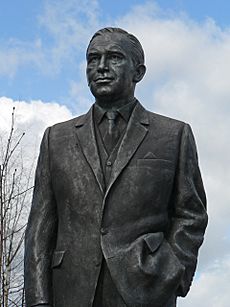
Alf Ramsey was one of the first people to be put into the English Football Hall of Fame in 2002 for his work as a manager. He became the first person to be inducted twice when he was also added as a player in 2010.
A street next to Ipswich's Portman Road stadium was named Sir Alf Ramsey Way after his death. In 2000, a statue of Ramsey was put up at the stadium. In 2012, the South Stand at Portman Road was renamed the Sir Alf Ramsey Stand. In 2009, a statue of Ramsey was unveiled at Wembley Stadium. It is in the players' tunnel to remind players to always give their best.
Ramsey is seen as one of the greatest British football managers of all time. While his tactical style was not always loved by everyone, his success, especially winning the World Cup, speaks for itself.
Honours
As a player
Tottenham Hotspur
- First Division: 1950–51
- Second Division: 1949–50
As a manager
Ipswich Town
- First Division: 1961–62
- Second Division: 1960–61
- Third Division South: 1956–57
- FA Charity Shield runners-up: 1962
England
- FIFA World Cup: 1966
- UEFA European Championship third place: 1968
- British Home Championship: 1964–65, 1965–66, 1966–67, 1967–68, 1970–71, 1972–73
Individual
- English Football Hall of Fame Inductee: 2002
- Ipswich Town Hall of Fame: Inductee: 2011
- Berlin-Britz Manager of the Decade (1960s)
Career statistics
Club
| Club | Season | League | FA Cup | Total | ||||
|---|---|---|---|---|---|---|---|---|
| Division | Apps | Goals | Apps | Goals | Apps | Goals | ||
| Southampton | 1946–47 | Second Division | 23 | 1 | 1 | 0 | 24 | 1 |
| 1947–48 | Second Division | 42 | 5 | 4 | 0 | 46 | 5 | |
| 1948–49 | Second Division | 25 | 2 | 1 | 0 | 26 | 2 | |
| Total | 90 | 8 | 6 | 0 | 96 | 8 | ||
| Tottenham Hotspur | 1949–50 | Second Division | 41 | 4 | 3 | 0 | 44 | 4 |
| 1950–51 | First Division | 40 | 4 | 1 | 0 | 41 | 4 | |
| 1951–52 | First Division | 38 | 5 | 2 | 0 | 40 | 5 | |
| 1952–53 | First Division | 37 | 6 | 9 | 0 | 46 | 6 | |
| 1953–54 | First Division | 37 | 2 | 6 | 0 | 43 | 2 | |
| 1954–55 | First Division | 33 | 3 | 3 | 0 | 36 | 3 | |
| Total | 226 | 24 | 24 | 0 | 250 | 24 | ||
| Career total | 316 | 32 | 30 | 0 | 346 | 32 | ||
International
| National team | Year | Apps | Goals |
|---|---|---|---|
| England | 1948 | 1 | 0 |
| 1949 | 1 | 0 | |
| 1950 | 9 | 0 | |
| 1951 | 7 | 1 | |
| 1952 | 7 | 0 | |
| 1953 | 7 | 2 | |
| Total | 32 | 3 | |
- Scores and results list England's goal tally first, score column indicates score after each Ramsey goal.
| No. | Date | Venue | Cap | Opponent | Score | Result | Competition | Notes |
|---|---|---|---|---|---|---|---|---|
| 1 | 28 November 1951 | Wembley Stadium, London, England | 18 | 1–1 | 2–2 | Friendly | Penalty | |
| 2 | 21 October 1953 | Wembley Stadium, London, England | 31 | Rest of Europe | 4–4 | 4–4 | Friendly | Penalty |
| 3 | 25 November 1953 | Wembley Stadium, London, England | 32 | 3–6 | 3–6 | Friendly | Penalty |
Managerial statistics
| Team | From | To | Record | Ref | ||||
|---|---|---|---|---|---|---|---|---|
| P | W | D | L | Win % | ||||
| Ipswich Town | August 1955 | April 1963 | 369 | 176 | 75 | 118 | 47.7 | |
| England | May 1963 | May 1974 | 113 | 69 | 27 | 17 | 61.1 | |
| Birmingham City | September 1977 | March 1978 | 28 | 11 | 4 | 13 | 39.3 | |
| Total | 510 | 256 | 106 | 148 | 50.2 | — | ||
Images for kids
See Also
 In Spanish: Alf Ramsey para niños
In Spanish: Alf Ramsey para niños
- List of English football championship-winning managers
 | Aaron Henry |
 | T. R. M. Howard |
 | Jesse Jackson |


